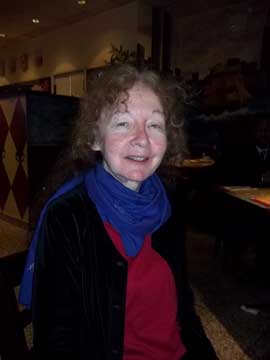|
Meeting at the U.S. Mission to the UN with Joshua Black
Joshua Black summarized four aspects of this issue that he thought were points of agreement between him and our delegation:
Nader Hashemi and Joanne Landy pointed out that the sanctions as enacted by the United States do affect vulnerable civilians; Kathy Kelly noted that they cause suffering even as far away as Afghanistan, which is affected by the rise in gas and oil prices caused by the Iran sanctions. Bitta Mostofi and Nader noted that sanctions undermine the pro-democracy movement in Iran, representatives of which have specifically asked that sanctions be lifted; in fact, the ban on importing hardware has further isolated the pro-democracy movement because it limits the movement’s capacity to import materials needed to develop its own independent communication networks. Several delegation members noted that the rules are not applied consistently. Madelyn Hoffman mentioned that the U.S. has acted hypocritically in its support for other countries that have nuclear weapons in violation of IAEA rules and in its own promotion of weapon proliferation. Toward the end of the meeting Azadeh Shahshahani noted that U.S. support for Israel's nuclear weapon buildup violates IAEA rules, and asked what steps the U.S. government is taking in trying to persuade the Israeli government to buy into the non-proliferation regime. Azadeh reminded Black of what he had said at the beginning of the meeting regarding the supposed “common ground” between our delegation and him, i.e. that the same rules should apply to everyone). In response, Black said only that it's a "difficult" issue. (Kathy added that were U.S. weapon supplies to Israel to pass through a tunnel, the tunnel would have to be the size of the Grand Canyon.) Delegation members noted that the bellicose and hypocritical posture of the United States in relationship to the Middle East North Africa region does not speak for us and that we believe security would be enhanced by a democratic just and peaceful foreign policy. Danny Postel quoted an imprisoned Iranian dissident Emadeddin Baghi, who when asked what the U.S. can do to help the Iranian democratic struggle, replied, “Nothing.” Doing nothing would mean no sanctions, no threats of war, and no specific aid to grass roots efforts to create democracy. While some members of the delegation were not completely comfortable with this, they acknowledged that past history made it more important for the United States to take a back seat. Joanne said that she wished she lived in a country that could honestly and effectively speak up for human rights, but that the economic and political policies of the U.S. made this impossible. That’s why the Campaign for Peace and Democracy is committed to fundamental changes in how the United States relates to the rest of the world. Rosemarie Pace encouraged Mr. Black to question why Iran would want to develop nuclear weapons, noting that this is not surprising since Iran is surrounded by countries possessing nuclear weapons. Nader and Bitta noted that the U.S. failure to convincingly address Iran’s human rights violations, focusing instead on issues related to nuclear weapon development, indirectly supports the Iranian government’s intention to avoid talking about human rights, making it more difficult for campaigners on behalf of human rights. NOTE: Dana Balicki from CODE PINK arrived late so didn’t jump in to the discussion. Her comments are a separate item in this report. |

The Campaign for Peace and Democracy
promotes a new, progressive, and
non-militaristic U.S. foreign policy
 Joanne Landy of the Campaign for Peace and Democracy spoke on behalf of the group’s purpose and, following general introductions, Stephen Shalom reviewed his prepared statement.
Joanne Landy of the Campaign for Peace and Democracy spoke on behalf of the group’s purpose and, following general introductions, Stephen Shalom reviewed his prepared statement.